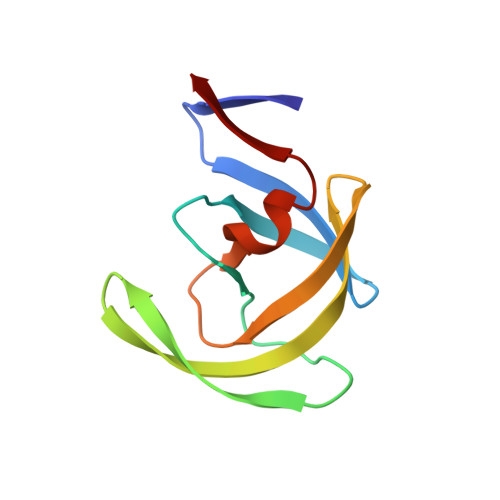Structure-based design of novel HIV protease inhibitors: carboxamide-containing 4-hydroxycoumarins and 4-hydroxy-2-pyrones as potent nonpeptidic inhibitors.
Thaisrivongs, S., Watenpaugh, K.D., Howe, W.J., Tomich, P.K., Dolak, L.A., Chong, K.-T., Tomich, C.-S.C., Tomasselli, A.G., Turner, S.R., Strohbach, J.W., Mulichak, A.M., Janakiraman, M.N., Moon, J.B., Lynn, J.C., Horng, M.-M., Hinshaw, R.R., Curry, K.A., Rothrock, D.J.(1995) J Med Chem 38: 3624-3637
- PubMed: 7658450
- DOI: https://doi.org/10.1021/jm00018a023
- Primary Citation of Related Structures:
1UPJ, 2UPJ, 3UPJ, 4UPJ - PubMed Abstract:
The low oral bioavailability and rapid biliary excretion of peptide-derived HIV protease inhibitors have limited their utility as potential therapeutic agents. Our broad screening program to discover nonpeptidic HIV protease inhibitors had previously identified compound II (phenprocoumon, K(i) = 1 muM) as a lead template. Crystal structures of HIV protease complexes containing the peptide-derived inhibitor I (1-(naphthoxyacetyl)-L-histidyl-5(S)-amino-6-cyclohexyl-3 (R),4(R)-dihydroxy-2(R)-isopropylhexanoyl-L-isoleucine N-(2-pyridylmethyl)amide) and nonpeptidic inhibitors, such as phenprocoumon (compound II), provided a rational basis for the structure-based design of more active analogues. This investigation reports on the important finding of a carboxamide functionally appropriately added to the 4-hydroxycoumarin and the 4-hydroxy-2-pyrone templates which resulted in a new promising series of nonpeptidic HIV protease inhibitors with improved enzyme-binding affinity. The most active diastereomer of the carboxamide-containing compound XXIV inhibited HIV-1 protease with a K(i) value of 0.0014 muM. This research provides a new design direction for the discovery of more potent HIV protease inhibitors as potential therapeutic agents for the treatment of HIV infection.
Organizational Affiliation:
Upjohn Laboratories, Kalamazoo, Michigan 49001, USA.















